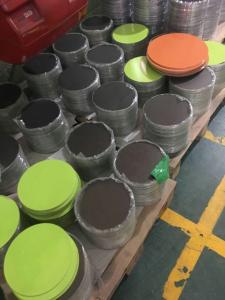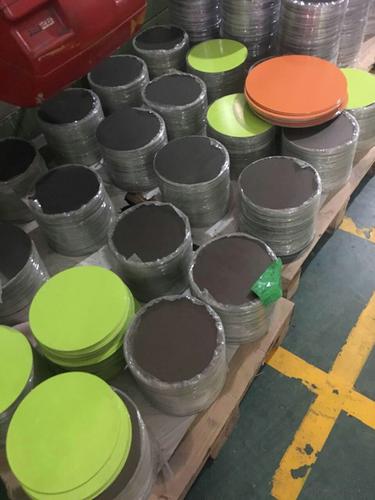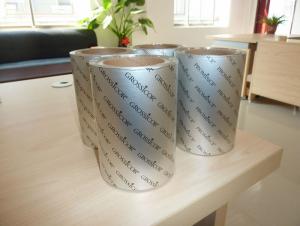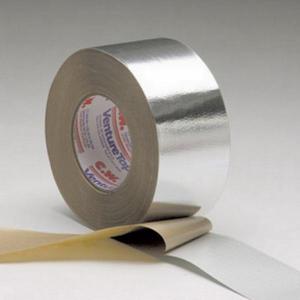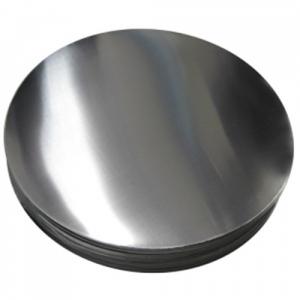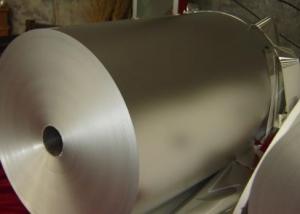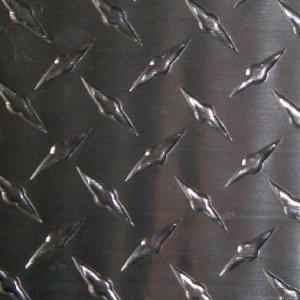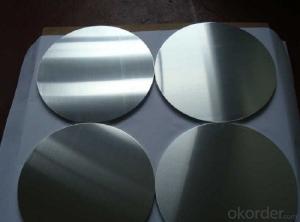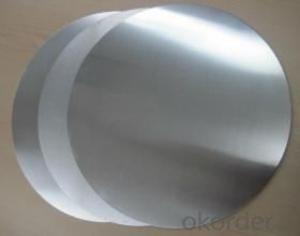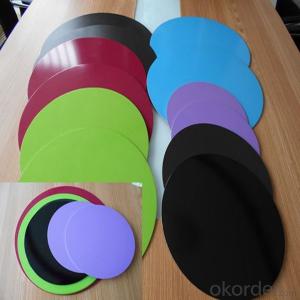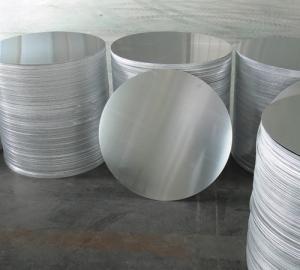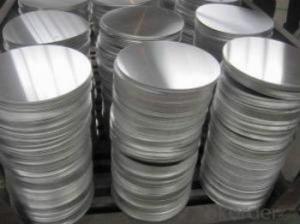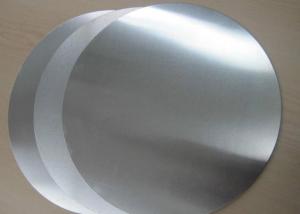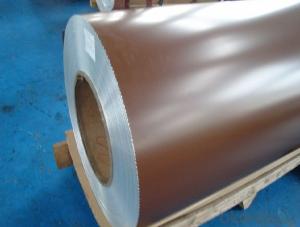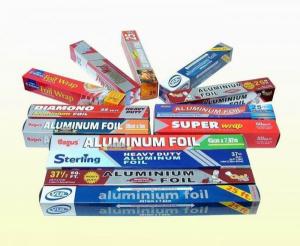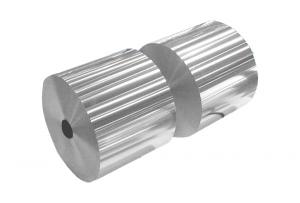High Quality Aluminum 3003/8011 Color Coated Mill Price Aluminum Circle
- Loading Port:
- Shanghai
- Payment Terms:
- TT OR LC
- Min Order Qty:
- 1 m.t.
- Supply Capability:
- 3000 m.t./month
OKorder Service Pledge
OKorder Financial Service
You Might Also Like
Specification
Product Description
Aluminium Circle for Cooking Utensils
1. Alloy: 3003, 8011
2. Temper: O,H12,H14,H16,H18,H19,H22,H24,H26
3. Hardness: 26 ~ 29
4. Elongation Percentage: 36% ~ 45%
5. Surface Treatment: Coated or Non-Coated
6. Thickness: 0.50mm ~ 6mm
7. Diameter: 100mm - 1520mm
8. Type: Discs, Circle
Product Applications:
Deep drawing quality,Less Scrap.
Suitable for making cookware and following products:
+Stock pots +Fry pans +Tea kettles
+Pressure cookers +Pizza pans + Rice cookers
+Restaurant cookware +Coffee urns + Electric skillets
+Bakeware, Bread Makers + Stainless cookware bottom plates.
Packing And Loading:
Standard Export Package And Customized Packing Ways Are Welcomed
- Q: Can reusing old aluminum foil be utilized for cleaning tasks in kitchen or bathroom areas?
- <p>Yes, old aluminum foil can be used for cleaning purposes in a kitchen or bathroom. It's particularly effective for scrubbing pots and pans, removing burnt-on food, and cleaning glass and tiles. The shiny side of the foil can be used to remove scuff marks from floors and the dull side can be used to scrub away stubborn stains. However, it's important to avoid using foil that has been in contact with acidic or corrosive substances, as it may have become damaged or weakened, and could potentially scratch surfaces. Always test on a small, inconspicuous area first to ensure it doesn't damage the surface you're cleaning.</p>
- Q: How can we decrease our reliance on aluminum in everyday life?
- <p>Yes, there are several ways to reduce the use of aluminum in daily life. Opt for glass, ceramic, or stainless steel containers instead of aluminum ones. Choose wooden or bamboo utensils over aluminum ones. When possible, select products with minimal aluminum packaging. Avoid non-stick cookware, as it often contains aluminum. Use a cast iron or glass baking sheet instead of aluminum foil in the oven. Educate yourself on the presence of aluminum in everyday products and make conscious choices to reduce exposure.</p>
- Q: Exploring the impact of reducing aluminum usage on global warming.
- <p>Using less aluminum in our daily lives can contribute to reducing global warming, albeit marginally. Aluminum production is energy-intensive, requiring significant amounts of electricity, often from fossil fuels. This process generates greenhouse gas emissions. By reducing demand for aluminum, we can potentially lower the energy consumption and emissions associated with its production. However, aluminum's impact on global warming is relatively small compared to other industries like transportation, energy production, and agriculture. Thus, while reducing aluminum use is beneficial, it should be part of a broader strategy to combat climate change that includes transitioning to renewable energy, improving energy efficiency, and adopting sustainable agricultural practices.</p>
- Q: Is it dangerous to consume food wrapped in aluminum foil due to the risk of aluminum poisoning?
- <p>There is minimal risk of aluminum poisoning from eating food wrapped in aluminum foil. Aluminum foil is designed to be food-safe and does not easily transfer aluminum to food under normal cooking conditions. However, at extremely high temperatures or when foil is used to cook acidic foods, there might be a slight increase in aluminum exposure. The body naturally excretes excess aluminum, and the small amounts typically ingested from food packaging are not considered harmful. Nonetheless, it's always a good idea to follow proper food handling and cooking practices to minimize any potential risks.</p>
- Q: What is the primary application of aluminum in various industries and everyday life?
- <p>Aluminum is most commonly used in the manufacturing of cans and packaging materials due to its lightweight, corrosion resistance, and recyclability. It is also extensively used in construction for window frames, roofing, and facades. In transportation, aluminum is a key material in the production of vehicles, particularly in the aerospace industry for aircraft and automotive industry for car bodies, due to its strength-to-weight ratio. Additionally, it is used in electrical components and electronics due to its good conductivity and malleability.</p>
- Q: Is it possible to incorporate aluminum in construction materials?
- <p>Yes, aluminum is commonly used in building materials due to its lightweight, high strength, and resistance to corrosion. It is used in window frames, roofing, facades, and structural components. Aluminum's malleability allows it to be shaped into various forms, and it's also recyclable, making it an environmentally friendly choice. However, it's important to note that while aluminum is used in construction, it's often combined with other materials to enhance its properties for specific applications.</p>
- Q: Is it safe to use aluminum cookware for cooking food?
- <p>Yes, aluminum can be used to make cookware that is safe for cooking food. Aluminum cookware is widely used due to its lightweight, durability, and good heat conductivity. While there were concerns about aluminum's potential health effects, current research indicates that the amount of aluminum leached into food during normal cooking is minimal and not harmful to health. However, it's important to avoid using abrasive cleaners or utensils on aluminum cookware to prevent scratching, as this could increase the amount of aluminum that might be released into food.</p>
- Q: What are the potential health advantages of minimizing contact with aluminum?
- <p>Reducing exposure to aluminum may have health benefits, particularly in terms of neurological health. Aluminum has been linked to neurodegenerative diseases like Alzheimer's, although the evidence is not conclusive. Lowering exposure could potentially reduce the risk of cognitive decline. Additionally, aluminum may affect bone health and the immune system, so minimizing contact could support stronger bones and a more robust immune response. However, it's important to note that aluminum is naturally present in many foods and water sources, and moderate exposure is generally considered safe by health authorities.</p>
- Q: Is it possible to utilize aluminum as a material in battery construction?
- <p>Yes, aluminum can be used in batteries. It is commonly used as a current collector in lithium-ion batteries due to its low density, high conductivity, and corrosion resistance. Aluminum's role is primarily structural, providing support and facilitating the flow of electricity. However, it is not used as an active material in the electrochemical reactions that generate power. Research is ongoing to explore the potential of aluminum as an anode material in next-generation batteries, aiming to improve energy density and reduce costs.</p>
- Q: This question asks for common uses of aluminum foil.
- <p>Aluminum foil is used for a variety of purposes. It is commonly used in cooking and baking to wrap foods, cover dishes to retain heat or prevent splattering, and line baking sheets for easy cleanup. It's also used for food storage, preserving freshness by sealing in moisture and flavor. In addition to culinary uses, aluminum foil is utilized in arts and crafts, insulation, and as a barrier in some packaging to protect products from light and air. It's also employed in scientific experiments and industrial processes due to its reflective and heat-conducting properties.</p>
Send your message to us
High Quality Aluminum 3003/8011 Color Coated Mill Price Aluminum Circle
- Loading Port:
- Shanghai
- Payment Terms:
- TT OR LC
- Min Order Qty:
- 1 m.t.
- Supply Capability:
- 3000 m.t./month
OKorder Service Pledge
OKorder Financial Service
Similar products
Hot products
Hot Searches
